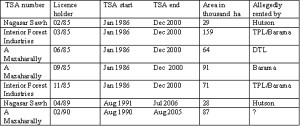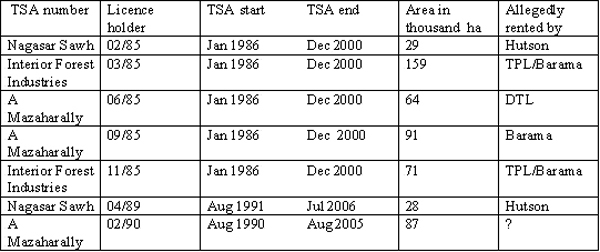Dear Editor,
The Minister for Forestry has signalled an intention to rescind part of the logging concession Timber Sales Agreement (TSA) 05/91 issued to Unamco Industries Ltd. In 1991 (‘Companies must comply or leave forestry sector,’ KN May 7, 2009; ‘Agriculture Minister debunks UNAMCO discrimination charges,’ KN May 8, 2009; ‘No compromising of compliance in forestry sector – Minister Persaud,’ KN May 12, 2009; ‘Community foresters to get part of UNAMCO concession,’ SN May 12, 2009). This concession is 130 thousand hectares (= 312 thousand acres, not the 237 thousand acres reported in SN) and adjoins the Case Timbers Limited TSA 01/97 of 74 thousand ha. The Unamco concession expired after 15 years in early 2007.
There is no dispute that Unamco has not complied with either the terms of its TSA licence or its investment plans for in-country processing of timber logs. Standard clause 6 of the TSA licence (in Second Schedule ‘A’ of the Forest Regulations 1953, as amended in 1982) requires the licensee “to work the area to the satisfaction of the Commissioner in accordance with the terms of this agreement”; the terms and conditions are in an attached schedule. Standard clause 16 provides for financial penalties or recision of the licence if the penalty is unpaid for more than three months. Before the expiry of the 15 year term (January 1992 to January 2007), Unamco could have invoked standard clause 11 to petition for renewal. The TSA licence itself (as laid out in standard form in the amended Forest Regulations) does not specify criteria for renewal. The Minister claimed, in the above-referenced articles in KN of May 8 and in SN of May 12), that “renewal is based on satisfying numerous transparent criteria, inclusive of compliance with the GFC guidelines, and implementation of the company’s approved business plan.” The Minister did not specify which of the GFC guidelines he was referencing, and no criteria specifically regarding TSA renewal are to be found on the GFC website.
If Unamco did not actually make a formal application for renewal, or if such an application was refused, then the GFC should have implemented another part of standard clause 11: “this Agreement shall expire on the agreed date, whereupon the grantor [the GFC] shall give notice to the grantee [Unamco] to remove within six months all the buildings and erections and all improvements on the area shall become the property of the State.” As the Unamco equipment and buildings are still on site, at least those not already stolen or vandalized, it would appear that either the GFC did not issue such notice, or Unamco has not complied with such notice, two years after expiry of the TSA licence.
These failures by both logging company and government (GFC and Minister for Forestry) are not limited to the Unamco case. Indeed, they appear to have been going on for almost a decade, apparently unnoticed either by the government-appointed Board of Directors of the GFC or the Natural Resources Sectoral Committee of the National Assembly.
Nine TSAs were issued as from 1985, for 15 years from January 1986 to January or December 2000. These nine TSAs (02/85 to 11/85) have a total area of between 0.8 and 1.2 million ha, depending on which set of GFC data one uses. After expiry in 2000, 8 of these 9 supposed long-term TSAs, for sustainable forest management and continued timber production, have been renewed as annual permits. Only one of the 9 TSAs has been extended for a substantial period: 30 years until December 2030 over 56 thousand ha, although the maximum period for a TSA is 25 years in the 1993 national policy on logging concessions.
Two of the licence holders named in the SN article of May 12 each had two TSAs in the 1985 allocation. Two of the three named licence holders each had an additional TSA with start dates in 1990-91 and ending in 2005-06. It is not clear if all six concessions are being rescinded, or only three of them. But all have expired. It is noteworthy that three of these concessions are allegedly rented by Barama, and that Barama’s parent company Samling Global Limited was explicit in its March 2007 IPO on the Hong Kong stock exchange that it had no intention of sustainably managing any of its (illegally) rented concessions. So it is likely that these concessions are now being rescinded after they have been selectively and unsustainably logged by Barama for the export log markets in Asia and are of no further interest.

TSAs which are not being properly harvested or managed should be returned to the pool of State Production Forest and kept in reserve and under ecological recovery from damaging piratical harvesting, or allocated for re-bidding under the provision for State Forest Exploratory Permits (under the 1996 amendment to the Forests Act 1953, and in accordance with the National Forest Policy 1997, Part III B 3 a and b, and the National Forest Plan 2001, sections NFP 200 and NFP 320). However, the strategic allocation plan required in these sections has yet to be prepared by the GFC, 12 years after the National Forest Policy was approved.
Re-allocation of the under-used Unamco TSA 05/91 to the community forestry associations of Region 10 accords with the recommendations by Duncan Macqueen of IIED and Andrew Mendes of Farfan & Mendes (‘Raising forest revenues and employment unlocking the potential of small and medium forest enterprises in Guyana,’ Discussion Paper, IIED Small and Medium Forest Enterprises Series number 12, 2006). Macqueen and Mendes argue that modern technology – frame-mounted rip-sawing chainsaws and mobile thin-kerf high-strain bandmills – are more efficient converters of logs than the under-capitalised fixed sawmills in Guyana, and could generate more revenue in forest taxes. However, such associations have hitherto been allocated only 2-year salvage logging State Forest Permits which allow free-roaming within the overall annual logging quota, with one unsuccessful early attempt at a TSA with the Ituni association. As the Unamco area appears to have sufficiently intact forest to justify sustainable management, the community forestry associations should be offered a 25-year TSA but subject to the same conditions as other TSA holders. In contrast to community forestry association experience to date, that means formal division into logging blocks, systematic working according to the GFC Code of Practice for Timber Harvesting 2002, pre-felling forest inventory, etc. This will mean substantial additional training, by the GFC among others, but focused on business and association management for the collective good (not just the executive committee of the association) as well as on harvesting and ecological techniques for sustainable forest management. This will be a major challenge for the field-shy GFC and for the involvement of institutional reform, field accountancy and mentoring specialists which the GFC does not have. The GFC and Minister for Forestry should spell out and publicise that strategic allocation for long-term sustainable forest management is the government’s intention, rather than continuing to constrain the community forest products associations to 2-year unsystematic salvage logging permits. The Minister should also clarify his concern about low output per ha. Higher output could be interpreted by loggers as further encouragement to over-harvest preferred timbers. The higher output should be qualified by reference to species-specific yield limits and post-harvest minimum stocking (as required by section 2.3 on page 8 of the GFC Code of Practice) and minimum inter-stump distance of 10 metres (section 5.1.3 on page 42 of the code). Continued failure to do so will signal to those who might consider REDD (carbon management) funding for Guyana that the GFC continues to lack strategic competence and is wasteful of the standing forest in Guyana. And what is the GFC intention with respect to the logging concessions worked out by Barama and other renters? How does their future fit in with the missing strategic allocation plan? So, Minister Persaud, please don’t admonish the Guyanese nominal holders of logging concessions until you upgrade the competence of the GFC to follow objectively and equitably the forest law, regulations and procedures. Please also remember that the secret arrangements made by Cabinet to favour foreign direct investment by Asian loggers give them a 30 per cent or more advantage in direct costs over Guyanese nationals, through duty free fuel alone, yet they continue to fail to comply with their investment plans. Apart from waving your hands, what are you doing about those investment failures?
Yours faithfully,
Mahadeo Kowlessar

